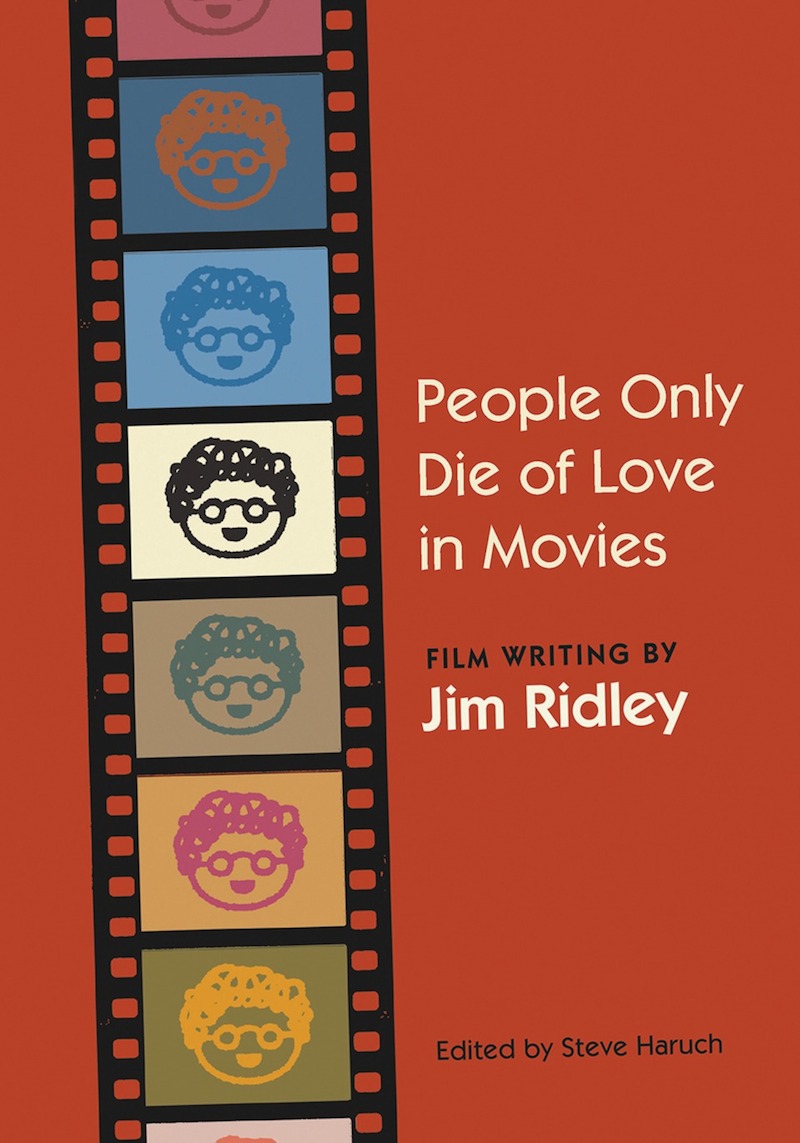When asked why she never wrote her memoirs, Pauline Kael famously answered, “I think I have.”
My friend Jim Ridley—film critic and editor-in-chief of the Nashville Scene, who died in April of 2016 at the cruel young age of 50—never got a chance to write his memoirs. But then I doubt a guy as self-effacing as Jim would have any patience for such a project anyway. What we got instead turns out to be even better than the next best thing. People Only Die of Love in Movies: Film Writing by Jim Ridley, is a hardcover collection of reviews and reported articles carefully culled from his almost thirty-year career. In vibrant, often uproarious prose, the book chronicles a lifelong love affair with the cinema. Reading Ridley’s reviews feels like having a jocular chat with a pal that takes an unexpectedly personal turn. His emotionally candid insights make Kael’s case for criticism as autobiography.
Expertly edited by former Scene staffer Steve Haruch, the book features 94 pieces, loosely grouped into 12 chapters according to genre or theme. It’s an inspired approach, giving the informal sensation of Ridley riffing on his favorite topics, whether the Nouvelle Vague or Westerns. Contemporaneous reviews of new releases sit alongside reconsiderations of classic films, the latter usually booked at Jim’s beloved Belcourt Theatre, the Nashville arthouse cinema he tirelessly championed over the years. (Also included here is the famous 1999 cover story in which Jim excoriated his readers for passing up the then-struggling cinema’s programming. “If it joins all those other ghosts in the civic boneyard, we should harbor no illusions about who put it there.”)
Enthusiasm can sometimes be a dirty word amongst professional film critics, many of whom pride themselves on keeping an objective distance from the work they’re evaluating. But reading Ridley you can’t help but think: here’s a guy who really loved his job. Whether discussing rotgut exploitation films or the French New Wave, Jim’s excitement was infectious. He proved you could be a fan without being fanboy-ish, a conversational tone often deftly camouflaging the intellectual rigor beneath his arguments. I adore this description of “Taxi Driver”: “Working from a serrated Paul Schrader script soaked in coke and flop sweat, Scorsese prowls the zone where the rugged individualism of such a man morphs into the I-stand-alone fury of America’s lunatic fringe.”
There’s a palpable joy of discovery in Jim’s original, early ‘90s reviews of “The Piano” and “Pulp Fiction.” Of the former he wrote: “Where the year’s other period romances involve people who gradually dwindle under the weight of their inexpressible desires, Campion’s characters blossom like carnivorous plants under the influence of flesh.” And of Mr. Tarantino’s opus: “Hearing Samuel L. Jackson say ‘motherfucker’ is like listening to John Coltrane play ‘My Favorite Things.’” These reviews spread out for three pages apiece, taking us back to a time when alt-weeklies had the space to cover the arts in this kind of depth, and studios were still making movies that merited such scrutiny.
Ridley was one of the funniest writers in the business, and while there’s at least a chortle on every page of “People Only Die of Love in Movies,” the biggest laughs come, unsurprisingly, in the chapter Haruch devotes to his pans. Jim didn’t run all that many negative reviews in the “Scene,” his philosophy being why waste space on a bad movie when you could be celebrating a good one. But when he did, boy howdy: “The target audience for a Jerry Bruckheimer action movie, especially one with director Michael Bay at the helm, is a guy who became a cop to get even with everybody who picked on him in high school.”
Most surprising is Jim’s 1993 negative review of “Schindler’s List,” which should be studied by young writers as an example of how to buck the consensus without resorting to contrarian posturing. He took issue with the film’s largely faceless presentation of the victims: “The violence is detailed so much more vividly than the characters that it throws off our perception: We’re more aware of the fountains of blood than we are of the people losing them.” And with regard to the film’s rapturous reception: “There’s something annoying about the way Spielberg repudiates his past work in interviews now, as if his beautifully crafted pop entertainments were somehow embarrassing in light of the heavy-handed, well-intentioned ‘Schindler’s List.’ If art were determined by good intentions, then ‘Judgement at Nuremberg’ would be the lasting work of film art and ‘Triumph of the Will’ largely forgotten, instead of the other way around.”
It’s an inevitably melancholy experience reading so much vital work by someone who left us too soon. (There’s still not a month that goes by in which I don’t see a movie and wonder what Jim would have made of it. And I hope there’s a heaven, so he’ll get to see “De Palma.”) It stings even more because Ridley was so eloquent about the ways in which our relationships with movies evolve over time, and it becomes clear throughout the book that age and fatherhood were deepening his perspective in rich and rewarding ways. (On “Ikiru”: “The difference between seeing Akira Kurosawa’s film early and later in life is the difference between looking at a window and a mirror.”)
My favorite piece is his appreciation of Francois Truffaut’s widely misunderstood “Two English Girls,” a deliberately downbeat revisiting of themes and scenarios explored ten years before in the director’s freewheeling “Jules and Jim.” While Ridley confesses he initially couldn’t get through the movie as a teen, “I love them equally now. The speed and whirling beauty of the former makes the latter even more poignant; the sad, persistent ache of ‘Two English Girls’ makes ‘Jules and Jim’ seem even more buoyant. To choose between them would be to choose between your first and greatest loves – between the one that taught you how to feel, and the one that’s all the richer and deeper for the memory of the other.”
People Only Die of Love in Movies takes its title from a line in Jacques Demy’s heartbreaking 1964 musical “The Umbrellas of Cherbourg,” for which Jim wrote the Criterion Collection booklet essay. It’s a gorgeous piece of writing with which Haruch closes out the book, summing up its author’s ever-evolving adoration of the film and how changing life circumstances have altered his interpretation over the years: “When I watch it now, it reminds me of the doorjamb in my grandmother’s house with my height marked in pencil over the years, or the dresser with my own children’s measurements notched along the edge. In it I see the person I was and the person I turned out to be. But the object itself will always be the same. It will wait, forever.”
“People Only Die of Love in Movies: Film Writing by Jim Ridley” was released on June 21st, 2018 by Vanderbilt University Press.












